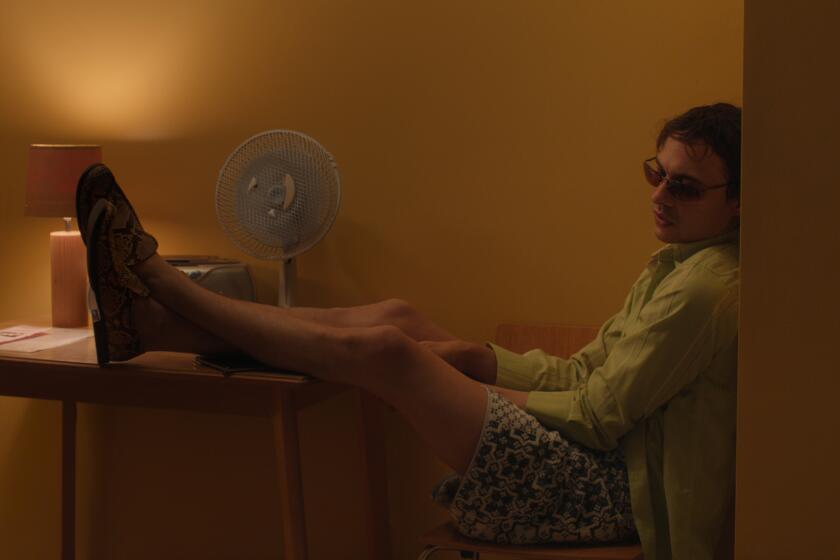Review: ‘93Queen’ offers an insider’s view of women’s lives in a self-contained Hasidic community
- Share via
Whatever their manifold differences may be, ultra-orthodox Muslims and ultra-orthodox Jews do share a zealous determination to keep women away from motorized vehicles.
While Saudi Arabia until quite recently kept women from driving at all, a similar dynamic played out in the Hasidic enclave of Borough Park, Brooklyn, as revealed in the intimate, engaging documentary “93Queen.”
As shot, directed and co-produced by Paula Eiselt, this heartening, unexpected story shows what happens when a group of Hasidic women, led by tireless, charismatic attorney Rachel “Ruchie” Freier, decided to create the first all-female volunteer ambulance corps in all of New York City.
While the insular, self-contained Hasidic community has been portrayed in film a lot recently, from the documentary “One of Us” to the Sundance drama “Menashe,” “93Queen” is the first to be directed by an Orthodox woman who agreed to follow “Hasidic modesty tenets” during filming.
What this means in practice is that filmmaker Eiselt has been able to shoot from the inside. She brings an instinctive yet clear-eyed sympathy for these women’s remarkable story, joined with an ability to be candid about the difficulties that arose within the group and with the greater Hasidic community.
The irony of the controversy surrounding the existence of this group of emergency medical technicians known as Ezras Nashim, “helping women,” is that its core idea came not from a desire to rebel against Orthodox tenets but a passion for being true to them.
Gender separation is so extreme among the Hasidism that men and women cannot even shake hands. The only time touch is allowed is in life-threatening situations, but, the question arose, might not women in this culture want other women to help them, especially in intimate situations like home childbirth? When Ruchie Freier says, “We need to have another option,” you would think it would be hard to argue the point.
The problem is that Hatzolah, the existing all-male EMT organization that is the largest volunteer ambulance group in the world, has no use for women joining its ranks.
“Women can’t match our response time,” says a Hatzolah member, his face in shadows. “Their duty is to stay home and raise the children,” a common Hasidic refrain.
To which Ruchie Freier responds, “The worst thing you can tell me is that I can’t do something because I’m a woman, a religious woman, the worst thing.”
The organization that became Ezras Nashim came not from Freier but Yocheved Lerner, a woman who came to Orthodox practice later in life but before that spent years as a certified EMT. From the first glimpse we get of Freier, it’s understandable why Lerner wanted her involved.
Elegantly dressed, self-possessed, the kind of person who makes the trains run on time, Freier is a woman who has never felt she had to sacrifice what she wanted to achieve to her religious beliefs.
Strictly observant and the mother of six children, Freier bakes her own challahs and practices law with her supportive husband. Whoever said, if you want anything done give it to a busy person, might have had her in mind.
Filmmaker Eiselt not only gets close to Freier and Lerner, she introduces us to some of the other women who want to join Ezras Nashim, including Hadassah Ellis, recently divorced at 29, who sounds the common refrain that “no woman should ever be too embarrassed to call for help.”
As soon as word of Freier and Lerner’s plan gets around, the Hasidic world’s internet trolls anonymously attack, accusing her of “challenging Torah and playing with fire” and worse.
The women press forward, undeterred, practicing medical techniques, trying to find a rabbi to publicly support them and acquiring the city fire department radio code that gives the film its name.
A realist who dreams of running for civil court judge, Freier has a sense of what needs to be done to make this happen that her collaborators do not always share, and how that plays out within the group is emotional enough to bring some members to tears.
“I believe we have God’s endorsement,” Freier says emphatically at one point, and the mysterious ways the deity works make “93Queen” both surprising and deeply satisfying.
---------
‘93Queen’
Not rated
Running time: 1 hour, 25 minutes
Playing: Laemmle Town Center 5, Encino, starting Friday at Laemmle Music Hall, Beverly Hills
More to Read
Only good movies
Get the Indie Focus newsletter, Mark Olsen's weekly guide to the world of cinema.
You may occasionally receive promotional content from the Los Angeles Times.









